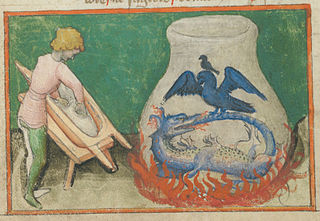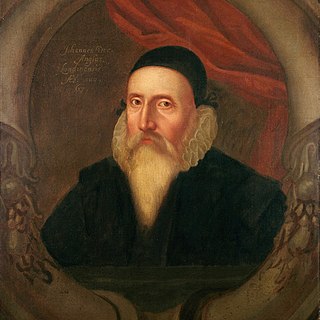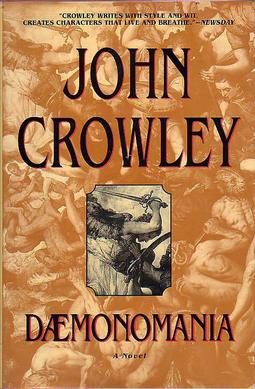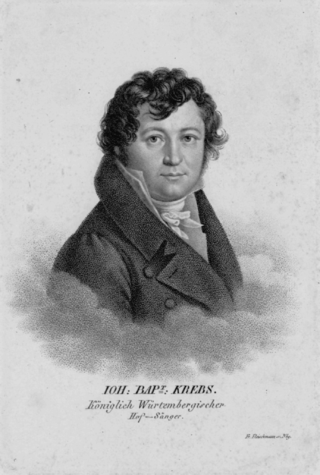
Alchemy is an ancient branch of natural philosophy, a philosophical and protoscientific tradition that was historically practised in China, India, the Muslim world, and Europe. In its Western form, alchemy is first attested in a number of pseudepigraphical texts written in Greco-Roman Egypt during the first few centuries AD. Greek-speaking alchemists often referred to their craft as "the Art" (τέχνη) or "Knowledge" (ἐπιστήμη), and it was often characterised as mystic (μυστική), sacred (ἱɛρά), or divine (θɛíα).

The afterlife or life after death is a purported existence in which the essential part of an individual's stream of consciousness or identity continues to exist after the death of their physical body. The surviving essential aspect varies between belief systems; it may be some partial element, or the entire soul or spirit, which carries with it one's personal identity.

Enochian is an occult constructed language—said by its originators to have been received from angels—recorded in the private journals of John Dee and his colleague Edward Kelley in late 16th-century England. Kelley was a scryer who worked with Dee in his magical investigations. The language is integral to the practice of Enochian magic.

Gustav Meyrink was the pseudonym of Gustav Meyer, an Austrian author, novelist, dramatist, translator, and banker, most famous for his novel The Golem. He has been described as the "most respected German language writer in the field of supernatural fiction".

Sir Edward Kelley or Kelly, also known as Edward Talbot, was an English Renaissance occultist and scryer. He is known for working with John Dee in his magical investigations. Besides the professed ability to see spirits or angels in a "shew-stone" or mirror, which John Dee so valued, Kelley also said that he possessed the secret of transmuting base metals into gold, the goal of alchemy, as well as the philosopher's stone itself.

Enochian magic is a system of Renaissance magic developed by John Dee and Edward Kelley and adopted by more modern practitioners. The origins of this esoteric tradition are rooted in documented collaborations between Dee and Kelley, encompassing the revelation of the Enochian language and script, which Dee wrote were delivered to them directly by various angels during their mystical interactions. Central to the practice is the invocation and command of various spiritual beings.

An adept is an individual identified as having attained a specific level of knowledge, skill, or aptitude in doctrines relevant to a particular occult discipline, such as alchemy or magic.

William Walker Atkinson was an attorney, merchant, publisher, and author, as well as an occultist and an American pioneer of the New Thought movement. He is the author of the pseudonymous works attributed to Theron Q. Dumont and Yogi Ramacharaka.
Taghairm, sometimes interpreted as "spiritual echo," or calling up the dead, was an ancient Scottish mode of divination. The definition of what was required varied, but often involved torture or cruelty to humans or animals and sometimes included animal sacrifice.
Cassiel is an angel appearing in extracanonical Jewish, Christian, and Islamic mystical and magical works, often as one of the Seven Archangels, the angel of Saturn, and in other roles.

The body of light, sometimes called the 'astral body' or the 'subtle body,' is a "quasi material" aspect of the human body, being neither solely physical nor solely spiritual, posited by a number of philosophers, and elaborated on according to various esoteric, occult, and mystical teachings. Other terms used for this body include body of glory, spirit-body, luciform body, augoeides, astroeides, and celestial body.
A watchtower or guardian in ceremonial magical tradition is a tutelary spirit of one of the four cardinal points or quarters. In many magical traditions, they are understood to be Enochian angels or the Archangels Uriel, Raphael, Michael, and Gabriel. They are also variously associated in other traditions with each of the four classical elements or stars. Originating with the Enochian tradition of John Dee, a version of it was popularized by the Hermetic Order of the Golden Dawn, which became hugely influential in modern Western Esotericism, including Wicca. The watchtowers are invoked during the ritual of casting a magic circle.

John Dee was an English mathematician, astronomer, teacher, astrologer, occultist, and alchemist. He was the court astronomer for, and advisor to, Elizabeth I, and spent much of his time on alchemy, divination, and Hermetic philosophy. As an antiquarian, he had one of the largest libraries in England at the time. As a political advisor, he advocated the foundation of English colonies in the New World to form a "British Empire", a term he is credited with coining.

Monas Hieroglyphica is a book by John Dee, the Elizabethan magus and court astrologer of Elizabeth I of England, published in Antwerp in 1564. It is an exposition of the meaning of an esoteric symbol that he invented.

Renaissance magic was a resurgence in Hermeticism and Neoplatonic varieties of the magical arts which arose along with Renaissance humanism in the 15th and 16th centuries CE. During the Renaissance period, magic and occult practices underwent significant changes that reflected shifts in cultural, intellectual, and religious perspectives. C. S. Lewis, in his work on English literature, highlighted the transformation in how magic was perceived and portrayed. In medieval stories, magic had a fantastical and fairy-like quality, while in the Renaissance, it became more complex and tied to the idea of hidden knowledge that could be explored through books and rituals. This change is evident in the works of authors like Spenser, Marlowe, Chapman, and Shakespeare, who treated magic as a serious and potentially dangerous pursuit.

Daemonomania is a 2000 fantasy novel by John Crowley. It is Crowley's seventh novel, and as the third novel in Crowley's Ægypt Sequence, a sequel to Crowley's 1994 novel Love & Sleep. The novel follows protagonist Pierce Moffett as he continues his book project begun in The Solitudes about the Renaissance and Hermeticism, while dealing with a stormy relationship with his girlfriend Rosie Ryder.
According to some literary and religious studies scholars, modern Theosophy had a certain influence on contemporary literature, particularly in forms of genre fiction such as fantasy and science fiction. Researchers claim that Theosophy has significantly influenced the Irish literary renaissance of the late 19th and early 20th centuries, notably in such figures as W. B. Yeats and G. W. Russell.

Johann Baptist Krebs, was a German opera singer, opera director, vocal pedagogue, freemason and esoteric writer.
A magical alphabet, or magickal alphabet, is a set of letters used primarily in occult magical practices and other esoteric traditions. These alphabets serve various purposes, including conducting rituals, creating amulets or talismans, casting spells, and invoking spiritual entities. Several magical alphabets, including the Celestial Alphabet, Malachim, and Transitus Fluvii, are based on the Hebrew alphabet, which itself has a long history of use in mystical and magical contexts.












